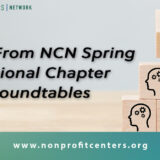Evaluation: Do I have to??
Last week we gathered for another Ask-NCN Live member-only call to discuss evaluation.* Despite this being a requested topic, there was a tangible fear that kept people from submitting their questions on the registration form.
But this is not new to NCN, and we don’t blame people! We purposely sought out an evaluation expert for NCN’s Evaluation Project 2 years ago and brought the same organization – Laura Sundstrom of Vantage Evaluation – in for our call. (These have always been member-only calls, but we knew this call would need some outside support!)
We get it – who’s got the expertise, the time to execute, the human power to get it done and what do you do with the data once you’ve got it? Can we just stick to operating spaces and improving collaboration?
Yes, you can. But it’s all connected. Evaluation is not just for reviewing what’s working or not working. It informs your next steps – your offerings to your tenants and your programming for future collaboration.
So, I’m sorry to report that we should be doing this more. But, where do you start? Here are a few tips around what to focus on, how to do it, and how to advocate to your community and funders the importance of evaluation.
What to focus on?
- Laura emphasized asking yourself the question, “What do you want to learn?” not, what do you want to know. Having a strong Theory of Change will guide this question, reminding yourself of what you can have an impact on, and thus, what data you need to gather to evaluate that.
- Gather both quantitative (how much) and qualitative (how and why) data. You need the numbers, but you also need the stories.
- Start by gathering before and after info with new tenants. Begin with questions around their prior space and operations: rental costs, SQ FT, amenities, location, quality of space, staff morale, etc. and ask those same questions 1 – 3 years in.
How do you do it?
Each center needs to determine what steps they are willing to take based on time and money. Start with what works now and then expand to these other ideas.
- Be curious! Start informally asking questions about what you want to learn. Make it a part of your culture. It can be a simple survey or just a conversation in your shared kitchen.
- Make it fun. Plan an event or plant incentives for your survey where everyone tells a story of collaboration with prizes for the best story (or any other categories you want to create).
- For something more serious and a larger focus on qualitative data, schedule interviews or focus groups.
- Quarterly town halls – this gives you an opportunity to collect feedback AND communicate how you are responding to prior feedback.
- Surveys! But heed these warnings when you do so:
- Be short and sweet, both in your question wording and the overall survey. Make sure every question has a purpose and put your most important questions at the start of the survey, because a percentage of people will always drop off.
- Don’t require questions – you may get an inaccurate response, or people will not proceed to the questions they can/want to answer.
- Avoid double-barreled questions (asking 2 questions in one), which you can easily identify through the word “and.”
- Don’t ask leading questions where it’s obvious how you want the question to be answered. For example, “How hard is it to find affordable housing?” assumes there is a challenge involved. (However true that may be…)
Advocate for Evaluation
- Funders want reports and feedback on what they supported. But executing the project is all-consuming and it costs money. Whether tackling internally or outsourcing, ask for funding to support evaluation of the program.
- Go in on it together! Shared spaces offer the benefit of bulk group purchasing. One NCN member is working with a local university to walk their tenants through an evaluation course, with certification possible if you attend 5 of the 7 offerings. Each of your tenants evaluates their work, which helps evaluate your center in return! It makes it easier on your tenants’ budgets and/or you can apply for a grant for the center to run it as a member benefit.
You don’t have to wait until the funding comes in. Start with that curiosity in your day to day interactions with tenants and gradually build the discipline and mind-set around evaluation from there.
*Topics chosen based on a yearly member poll







